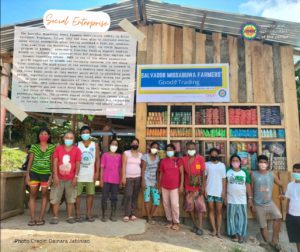“We passed by a house where an old widow lived. She was not on our list. When she learned that we are distributing rice, she cried asking if she could have it, too, because she had nothing for supper,“ Gerlyin Coguit shared. Gerlyn heads the Undilay Coguit Heritage Domain Farmers, Inc. in La Paz, Agusan del Sur. She took charge of distributing relief goods provided through EcoWEB’s COVID-19 response project.
This is one of the situations where Gerlyn has to find ways to equally serve the Manobo people in her ancestral domain.
Life is very hard in this part of interior Mindanao. To reach her barangay of Angeles from the town, La Paz, one needs one whole day to travel by habal–habal along narrow muddy trails and across swift rivers. The lack of basic facilities like farm-to-market roads forced the IPs to settle with subsistence farming.
“A few years back,” Gerlyn narrated. “We receive vegetable seeds, corn seeds, and palay so that we could start farming. But we cannot plant more than what we can eat. We cannot bring our produce to town because of the distance and of the very bad road. One way-fare by habal-habal is P1,500. And you have to sleep there. Do you think that encourages us to do farming? So, IPs here survive without money, but they need money to buy some things.”
One option for the people here is to go to town and cities and look for menial work. But the ECQ marooned them. Those who have family members working in distant places cannot send their money home. Now, they have to rely on root crops from their farm eaten with whatever they can forage from the river and forest.
Gerlyn explained to her people that they will not always receive such blessing. That is why she required those whom she gave food packs to work on their farms and plant vegetables and upland rice. There is no excuse for people in Gerlyn’s barangay not to work on their farms amid this covid-19 ECQ.
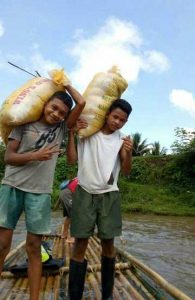
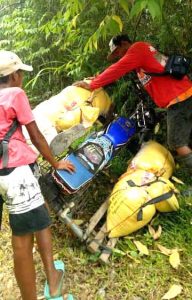
Gerlyn was able to give five kilos rice, 1 pack noodles, one-half kilo sugar, and one can sardines to at least 100 families.
“EcoWEB gave us P30,000. We saved a lot on transportation because the community volunteered to transport the goods,” Gerlyn pointed out. “And our tribal leaders helped in identifying those who need help and who are willing to work on their farms as we require,” she continued.
“You can see how far our small help goes,” Regina Antequisa, EcoWEB’s Executive Director remarked. “That is the good thing about localization. Distance is not a problem. If we distribute the goods ourselves, the money will just be consumed by transportation. That is why we must work with the local people. They know the place well and understand the problem on the ground. It’s a way of empowering them,” she further explained.
The funds given to the community of Gerlyn is part of the Gawad Kalasag cash award that EcoWEB received last year for winning the best civil society organization in the Philippines.
In 2017, EcoWEB responded to a flooding emergency in Gerlyn’s community. Together, they adopted the sclr (survivor and community-led response) to fast-track the response and to save on cost.
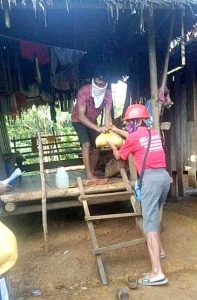
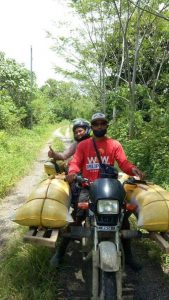
Gerlyn knew that the old widow can no longer work on the farm, as was the requirement for receiving the food pack. But she cannot overlook her knowing that she had nothing for supper. She said that her daughter who works in Butuan was not able to send her provisions because of the ECQ.
Gerlyn motioned to her companion to give a pack to the old widow, praying there will be enough for everybody on her list.


